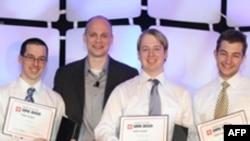This is the VOA Special English Technology Report.
Last week we reported on Microsoft Corporation’s Imagine Cup finals in the United States. Team FlashFood from Arizona State University won top honors at the event. Its mobile application and website lets hotels, restaurants and farmers markets donate food to people who need it.
The FlashFood project grew out of the Engineering Projects in Community Service program at Arizona State. The director of the program, Richard Filley, says the project has far-reaching possibilities. Mr. Filley plans to work with the team to decide what changes are necessary to make the project successful in other countries. For example, he notes a method of saving uneaten food, commonly called a doggie bag.
RICHARD FILLEY: “After you’ve gone to a restaurant, if you don’t eat all the food you take what’s left over and put it in what’s called a doggie bag. You take it home. You may feed it to the dog or you may eat it. Would those cultures in those different countries be open to the idea of taking leftover food and using FlashFood to connect with people who are hungry? We don’t know the answer to that yet.”
The Microsoft Imagine Cup competition is now in its tenth year. Mark Hindsbo is a vice president with Microsoft. He says students today have a lot of technology available to help with their projects.
MARK HINDSBO: “In the beginning people were building almost everything from scratch. We have built a lot of things in the industry over those ten years.”
Mr. Hindsbo says many of the software applications needed to complete such projects already exist. He offers Team FlashFood as a good example.
MARK HINDSBO: “The fact that they can build on the assumption that there are smartphones in the hands of most of the people that they need to coordinate with, there’s an online service with mapping and turn by turn direction.”
The Microsoft official says solving world problems is a major goal of the Imagine Cup competition. But, he adds, there is another goal that is equally important.
MARK HINDSBO: “In the U.S. alone we have probably around a million jobs that risk being unfilled over the next five years within the software and tech sector because we don’t have enough students. So when you look at the pipeline in science, technology engineering and math we come up way short.”
Mark Hindbro says he welcomes any efforts to increase interest in these areas of study.
A team from Drexel University also was a winner at the Imagine Cup finals in the United States. The Drexel Dragons designed a game to help students better understand mathematics. The Dr. Fishbowl team from Carnegie Melon University designed a game that teaches about sustainability, byproducts and waste.
Team FlashFood will represent the United States at the Imagine Cup worldwide finals in Sydney, Australia. The event takes place July sixth through the tenth. And that's the VOA Special English Technology Report. I'm Faith Lapidus.
___
Contributing: June Simms



